|
To Be Serious – and sad – For a Moment
I and my colleagues here at Shots were devastated to hear of the death of Diana Norman, a respected and scholarly historical novelist who was also adored by historical mystery fans for her award-winning Adelia Aguilar ‘Mistress of the Art of Death’ series written under the name Ariana Franklin.

Not only was she a good writer who knew her stuff when it came to the 12th century (she was a great fan of Henry II and far from impressed by Thomas à Becket’s claims to sainthood); but she was generous with her praise for other writers and utterly charming whenever confronted by her readers.
As one of the youngest female reporters in Fleet Street, she interviewed Raymond Chandler on his last return visit to London before his death, but although an accomplished novelist she herself did not turn to crime-writing until 2007 with Mistress of the Art of Death which was an instant success and won her the Ellis Peters Award.
I asked Diana to be a guest lecturer at my crime-writing summer school in Cambridge last year, but five months before she warned me that she was facing chemo-therapy and hospitalisation though she was confident she would be fighting fit in time for the August course and almost joking about the medical trials she had to face. Things turned out worse than anyone could have foreseen and Diana became very seriously ill, spending nine weeks in Intensive Care. It was only in early June that I heard from her husband Barry and daughter Emma that Diana’s condition seemed to be improving. My spirits were truly lifted, however, later in the summer when Diana resumed our regular email correspondence and her emails – even if the typing was a bit dodgy to begin with – showed all the charm and humour that were her trademarks.
The last thing I heard from her as it turned out, was her wonderful contribution to the Shots appreciation of 50 Getting Away With Murder columns. She was (honestly) a regular reader and would often chastise me for making her spend too much money on books she would not otherwise have heard of. Yet it was typical of Diana to turn her “appreciation” of this column into a blatant plug for my novel about Hereward the Wake, about which she had always been embarrassingly generous.
I will treasure her comments, just as I value this photograph of three of my favourite history-mystery writers: Ariana Franklin, Deryn Lake and Paul Doherty.

The New Recommendations Guru?
It is clear that writing not one but two international best-sellers and editing or contributing to several anthologies in the space of a year, has left Lee Child with little time to recommend books by providing generous quotes for their covers. At a loss for guidance when it comes to reading matter, I am therefore grateful to Tess Gerritsen who seems to have stepped into the breach and taken on Lee’s heavy reading load.
For Mo Hayder’s Hanging Hill, coming from Bantam in April, she keeps her recommendation short and sweet, saying simply: “Stunning”.
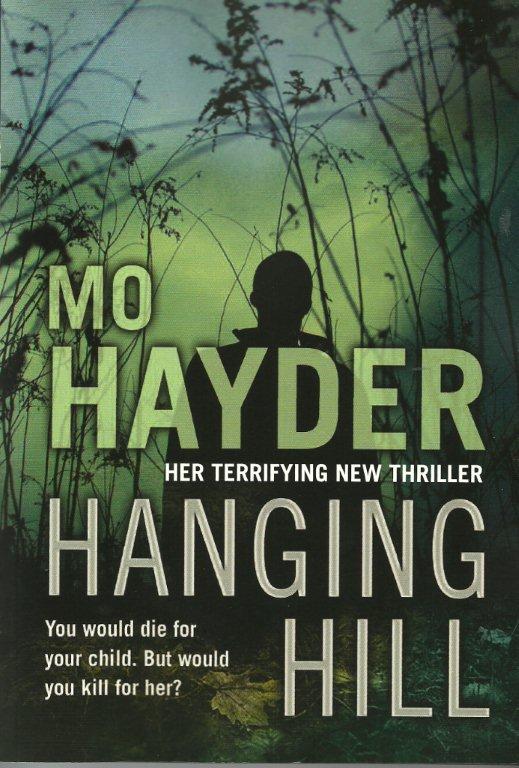
Then she tags fellow American James Hayman’s first novel The Cutting as “A stunning debut that gripped me from first page to last. A thriller of a thriller.”
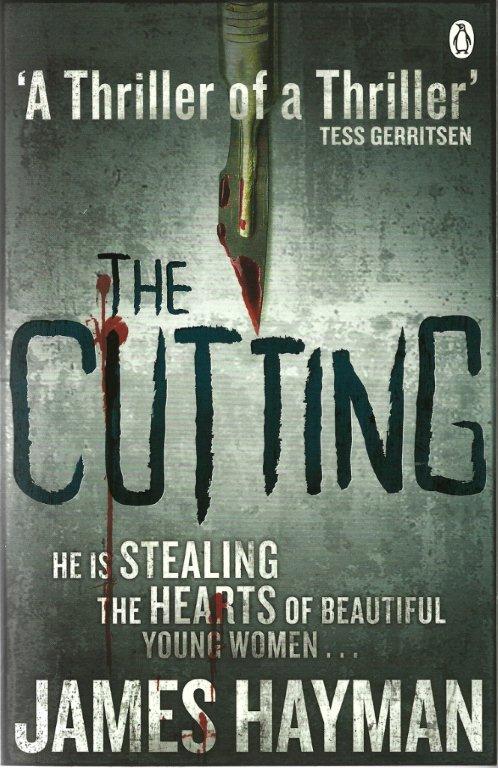
Now my perky friends at publishers Penguin, who all (co-incidentally) fall into the very attractive, 19-24 year old and blonde demographic, assure me as does Ms Gerritsen that this is a jolly exciting thriller and as the author is a former creative director of advertising (as was James Patterson) and lives in Maine (the home of Stephen King’s imagination), I suppose I should take it very seriously. However, I must admit that the in-bred cowardice on which we Ripsters have prided ourselves over the generations and the very rational fear of hospital operating theatres which comes with my great age, have made me somewhat wary thanks mainly to a cover which shows a blood-dripping scalpel and (on the back) various blood-drenched medical instruments in a kidney-shaped metal dish.
That and the tag-line “He is STEALING the HEARTS of beautiful young women” (sic) leaves little to even my dullard imagination, and so I am afraid I could not summon up the courage to read it. I am sure it is my loss and I am quite willing to admit that by writing about a “deviously motivated psychopathic serial killer” (as opposed to a well-balanced humanist serial killer I presume), James Hayman has hit on a winning formula. I mean, a thriller about a serial killer preying on women – who’d have thought of that one? Still, I am sure Ms Gerritsen knows what she is talking about when she recommends it.
I know she does when she says on the cover blurb of the new David Hewson novel The Fallen Angel that it is: “Intricately plotted and gorgeously written”.
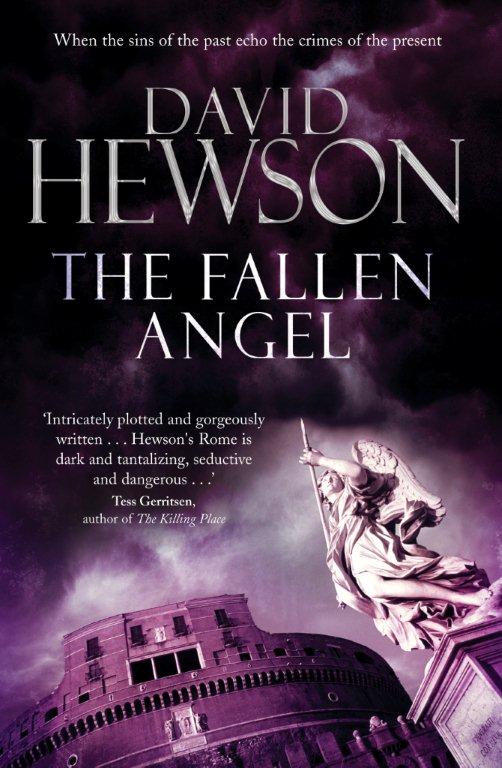
If anything, this is a writer and a series which should not need celebrity endorsement, but if it does introduce David’s excellent Rome-set Nic Costa mysteries to new readers (who have been presumably been living in a cave in the Tora Bora, or perhaps Scandinavia, since 2003), then more power to her blurbing elbow, say I.
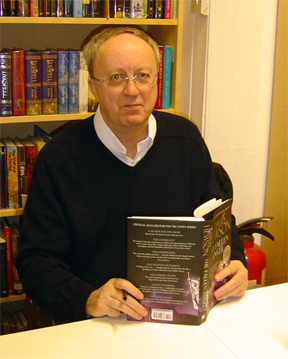 The Fallen Angel was launched over antipasti and a decent chianti in a fashionable London bookshop and I hear that the Nic Costa books have been optioned for television, so it is just possible – though the wheels of TV’s development hell grind exceeding slow – that the BBC’s sharp-suited Zen may have competition. The Fallen Angel was launched over antipasti and a decent chianti in a fashionable London bookshop and I hear that the Nic Costa books have been optioned for television, so it is just possible – though the wheels of TV’s development hell grind exceeding slow – that the BBC’s sharp-suited Zen may have competition.
However, I am indebted to Ms Gerritsen for flagging up a book as “Quite simply the best debut novel I’ve ever read” as, although I might not agree with that particular sentiment, it did bring Before I Go To Sleep to my attention – for which I am very grateful.

A thriller about amnesia by British debutant S.J. Watson, Before I Go To Sleep is not published here by Doubleday until April and so, naturally, has already appeared in America and Australia, not to mention being reviewed to death by the mysterious “Amazon Vine” programme (surely a good topic for a thriller itself – how a rogue computer programme takes over all the reviewing of crime fiction in the world and ruthlessly kills off all the professional reviewers....)
S.J. Watson (who is not, like P.D. and J.K., female) has certainly adopted a high-risk strategy for his first mystery. To begin with, it has a very small cast of characters – basically four – one of whom is a woman suffering from a form of traumatic amnesia which means that when she sleeps she forgets everything that has happened to her, and I mean everything. When she wakes up each morning, it’s a new, bewildering experience for her and it could be a Groundhog Day for the reader were it not for the clever device the author gives his heroine in that she is persuaded to keep a journal as a literal and vital aide memoire.
This technique is an interesting one, although it raises more questions than it answers for the layman with minimal experience of the neurological condition which has affected the heroine for a staggering amount of time and, as a narrative device it means the tension and drama of the climactic scenes are somewhat diluted. However, the story of the amnesiac, highly vulnerable heroine struggling to find out what happened to her (and what will happen to her) is undoubtedly gripping and the fact that I was constantly raising questions in my own mind as to why she remembered some things but not others, the very fact that I was pulled in to this story to such an extent is a sign of the quality of the writing.
Before I Go To Sleep is a very brave twist on the ‘psychological thriller’ format, generating a really creepy claustrophobic atmosphere around a central character who does not come across as particularly sympathetic, although the reader cannot help but feel anguish for her symptoms.
|
HURRAY FOR HOLLYWOOD....
I distinctly remember raving about Joseph Wambaugh’s hilarious Hollywood Station when it was published here in 2007. For legal reasons I was not made aware of the two followups, HollywoodCrows and Hollywood Moon, but veteran Wambaugh’s new publisher Corvus is determined not to allow his light to be hidden under a bushel.

Hollywood Hills is a quite wonderful cross-section of California wackiness as observed and experienced by the regular (and some time irregular) cops stationed in possibly the craziest precinct in Los Angeles. At the heart of Hollywood Hills is an art theft double scam, where the thieves themselves get robbed, but quite honestly, that’s not the reason you should read this book.
You should read it because it gives you a ringside seat at a circus parade of brilliant characters, poignant vignettes and brilliant gags, which are jaw-droppingly weird to most of us mortals but all in a day’s work for the men and women of the Los Angeles Police Department (of which Joseph Wambaugh was a serving member from 1960-1974). It’s like watching a continuous loop of the best bits of Hill Street Blues and is already one of my best books of 2011.
I do have to say, though, that the cover (a lone Jack Reacher figure stalking the bad guys?) does not do justice to this brash and breezy, but always honest, episodic take on the modern ‘police procedural’.
Coincidentally, I hear news of the forthcoming publication of a book very highly recommended by Joseph Wambaugh, for he describes Blue Blood as “Superb. The most stunning memoir ever written about the cop world.”

Edward Conlon’s memoir of his career in the New York Police Department, from rookie to Gold Shield detective, garnered rave reviews when first published in the US and probably deserves to be compared to David Simon’s classic Homicide as well as appealing to fans of The Wire. Blue Blood is published by the Ebury Press in March.
INSPECTOR GHOSTE RETURNED REVIVED
I am delighted to hear news the Harry Keating’s self-effacing detective Inspector Ghote (‘the Maigret of Mumbai’) is to reappear in a new and very attractive set of reissues by Penguin in May.
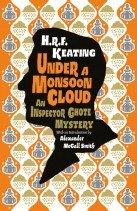
The first four classic cases to be re-published are: The Perfect Murder (from 1964), Inspector Ghote Breaks An Egg (1970), Inspector Ghote Trusts the Heart (1972) and Under A Monsoon Cloud (1986). All the reissues come with an introduction by Alexander McCall Smith.
Breakfast with a really nice man
I only met Michael Gilbert (1913-2006) once, when he was in his Eighties and we were staying in the same hotel while participating in some crime fiction convention or other. As my presence was required on a stage somewhere at the ungodly hour of 9 a.m., I duly reported to the hotel’s dining room for breakfast at 8 a.m. only to find every table full of tourists, convention delegates, travelling salesmen, adulterous couples and other assorted Muggles. The only other crime writer present (many were still in the bar from the night before) was Michael Gilbert, sitting alone at a table for two.
Nervously I asked for permission to join him to which he graciously agreed on condition that I didn’t mind him having a newspaper (The Times) at the table. My abiding memory of that breakfast (at which crime fiction was not mentioned once) was that I had been in the company of an extremely charming gentleman who could complete the Times crossword before I’d got the top off the first of my boiled eggs.
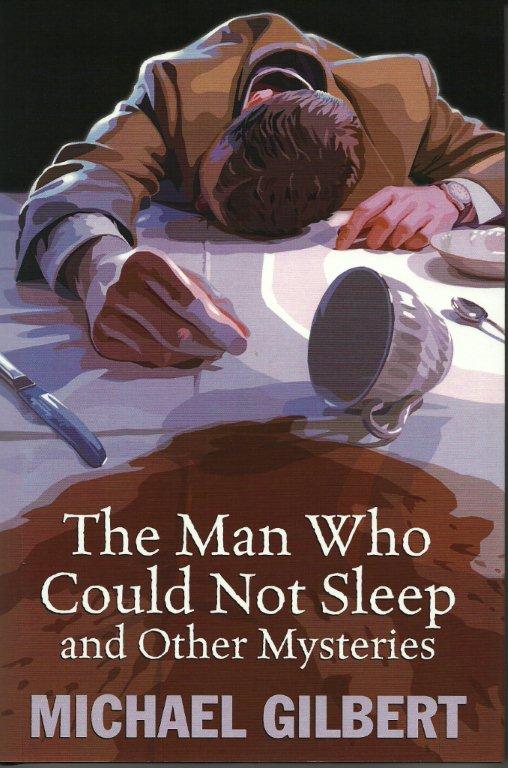
A founder-member of the Crime Writers Association in the 1950s and a Cartier Diamond Dagger winner, as well as being honoured by the Mystery Writers of America and the Swedish Academy of Detection, Gilbert was a prolific author and one of the most respected British crime novelists of the post-WWII era as well as a practising solicitor at Lincoln’s Inn. What is perhaps not so well known is his skill as a playwright and in The Man Who Could Not Sleep, compiled and introduced by John Cooper, four of his radio scripts and two synopses for proposed plays are published for the very first time by Robert Hale.
In all, Gilbert wrote around a dozen radio plays from 1955 to 1979, along with countless short stories and adaptations of his novels, as well as more than sixty dramas and serials for television from 1956 to 1975. The collected scripts in The Man Who Could Not Sleep give a valuable insight into the techniques of a skilled craftsman who clearly mastered more than one medium.
Praise Indeed
Needless to say, my factotum Waldo has been unable to keep a straight face or a civil tongue in his head since he read the over-generous tributes to me and this column on its 50th birthday last month. He was particularly taken with the revelations by Reginald Hill – who really ought to remember that I still hold the negatives – of our membership of The Really Close Friends of The Sound of Music Society. More than once Waldo has remarked caustically: “I suppose he rooted for the nuns and you for the Nazis”, but I continue to ignore him.
It seems I have also been mentioned by the Twitterati, which I discover does not refer to a sub-sept of the Ostrogoths, nor indeed to those irritating birdwatcher types who clutter up the grounds here in the Spring hoping to catch a glimpse one of the breeding pairs of Condors which help keep Ripster Hall free of pigeons, rodents, small mammals and Jehovah’s Witnesses.
No, it seems that – and I know this will come as a shock to the vast majority of my reader – Twitter is some form of electronic communication, mostly used by people with little to say and a daunting 140 characters to fill.
I had only just come to terms with ‘blogging’ and was delighted to find out there in the blogosphere, a leading brace of crime writers living in Italy refer to me as “a crime icon” whereas that excellent South African crime writer Mike Nicol calls me “that grand statesman of British crime fiction”.
Perhaps there are equally charming plaudits out there in Twitterdom, if only I could be bothered to find out how it worked.
THE VERY TALENTED MISS HIGHSMITH
Although fluent in Old Norse – indeed, I often leave notes for the milkman in futhorc, the runic alphabet, just to keep him on his toes – I have never claimed to understand any of the arriviste Scandinavian languages such as Swedish or Danish. (And Finnish is impossible unless you are a Finn or Hungarian.)
I am therefore grateful to my old friend Captain Iwan Morelius, the Crown Prince of Swedish crime fiction, for translating part of his always interesting website (www.hangmattan.site90.net) which currently contains a review of The Talented Miss Highsmith, Joan Schenkar’s biography of the iconic Patricia Highsmith which is due out in paperback any day now.
Joan Schenkar was a fortunate biographer as she gained access to the piles of papers (38 notebooks, 18 diaries, 14 scrapbooks and 8000 A4 pages of notes) which were collated by the local Swiss authorities after Patricia Highsmith’s death in Bern in 1995. Her biography also reveals, which I did not know, that Highsmith once wrote dialogue for comic books including Superman, Batman and Spiderman and worked for the same company as Mickey Spillane.
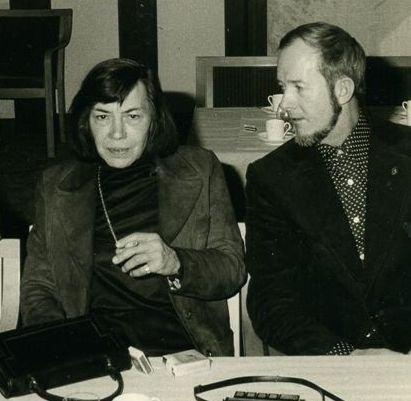
Patricia Highsmith was for many years a resident of East Anglia, living not that far from Ripster Hall, though our paths never crossed. Iwan Morelius however, did have the pleasure of meeting her in 1975 in Stockholm when she was honoured by the Swedish Academy of Detection and found her perfectly charming. She even confided to him that: “To write like I do, one has to be a bit crazy."
The New Per and Maj?
And speaking of Swedes, the frantic search by British publishers to find “the new Stig” (although those cheeky chaps on Top Gear seemed to have managed it) continues apace but it could be that the Blue Door imprint of HarperCollins has stumbled upon not the new Stig, but the new Maj Sjöwall and Per Wahlöö, the married couple who set the bench mark for Scandinavian crime writing (and set it very high) back in the 1960’s.
The Hypnotist, to be published here in May, is the first crime novel to be jointly written by married authors Alex and Alex Ahndoril (that’s Alexander and Alexandra, just to avoid confusion), under the pen-name Lars Keplar.
The book has been a best-seller in Sweden,Denmark, Italy and Holland and is, I believe, the first in an eight-book saga. My extensive network of spies in continental Europe tell me that the second book in the series, which in Swedish is titled Paganinikontraktet (The Paganini Contract) is even better and so excited were the publishers that a press trip of distinguished, not to say revered, critics of and commentators on crime fiction was suggested to meet the Ahndorils in Sweden. For legal reasons it is unlikely that I will be accompanying it.
|
In the meantime I will have to content myself with the first instalment of Leif Persson’s ‘The Story of a Crime’ trilogy, Between Summer’s Longing and Winter’s End which is published this month by Doubleday.
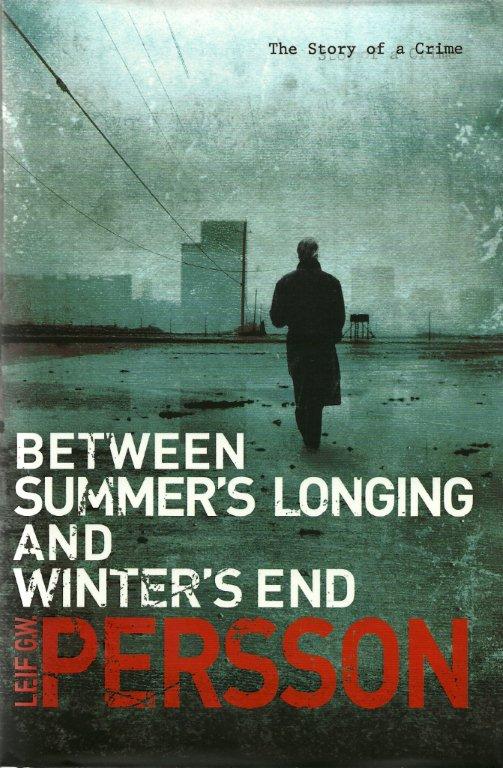
Although written almost ten years ago, the substantial trilogy is based on one of Sweden’s most notorious and unsolved true crimes, the murder of Prime Minister Olof Palme in 1986. Persson, at one time a criminologist and psychological profiler as well as an advisor to the Swedish ministry of Justice, is the award-winning author of nine novels but this is his first to be translated into English. Interestingly, I have seen the trilogy listed not as ‘The Story of a Crime’ series but as ‘The Fall of the Welfare State’, a title which could well find a more sympathetic response in the UK these days.
ALSO IN TRANSLATION
I feel no guilt these days in tipping Sebastian Fitzek for this year’s ‘Dagger in Translation’ award, for as he is German rather than Scandinavian, the odds are already stacked against him.
I really rated Fitzek’s Therapy when it appeared in the UK in 2008 and now his new British publisher Corvus (who seem to have done rather well in the transfer window) are producing his ‘psycho-thriller’ Splinter in April.
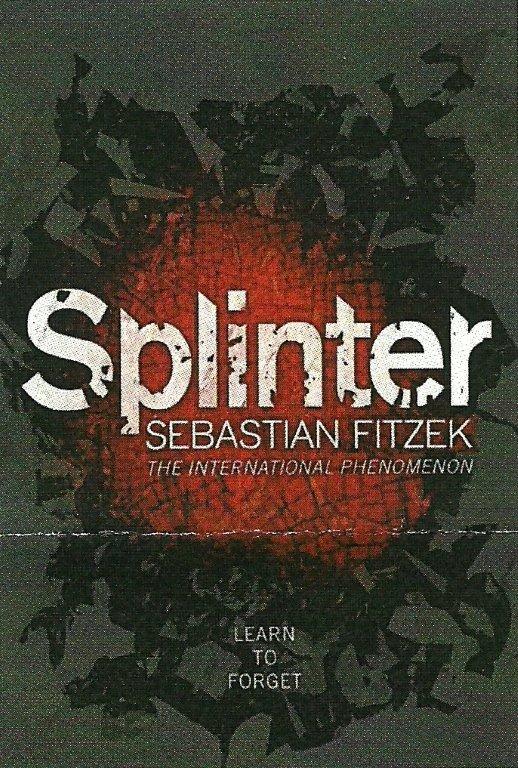
In real life, Fitzek – who bears a remarkable resemblance to music guru Mark Lamarr – is a radio and television journalist of some repute.
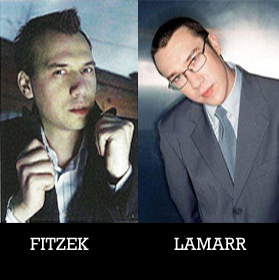
His fiction has a distinctly Hitchcockian feel to it and his six novels are said to have sold over two million copies in Europe, though I think only Therapy has appeared here before now. Legend has it that when his first novel zoomed into the #1 slot on the German Amazon site, Amazon UK sent Amazon.de a message asking: “Who the f*** is Fitzek?’
Box Set
And I must mention Corvus again (the cheque, I presume, being in the post) for this year they will be producing the ultimate Box set. By which, of course, I mean a set of thrillers by American C.J. Box.

Starting with his excellent stand-alone thriller Blue Heaven, one of my ‘finds’ of 2010, Corvus are issuing paperback editions of a new Box title every month throughout 2011. I know there are ‘completists’ out there (people who have to buy all the books in a series before starting to read one) who will be salivating at the prospect.
Now standing at the Station(s)
Frankly, I am shocked and appalled that David Downing’s ‘Station Quartet’ set in Berlin during over the years 1938-45, is not more of a household name or even on the National Curriculum, for I think that taken as ‘a piece’ (as the awful modern jargon goes) it is a fabulous achievement. I am delighted to hear that there is a fifth volume, extending the story into the Cold War, on the way.
In the meantime, those jolly industrious people at Old Street Publishing have produced the quartet in paperback with stylish matching covers, so ignorance is no longer an excuse.

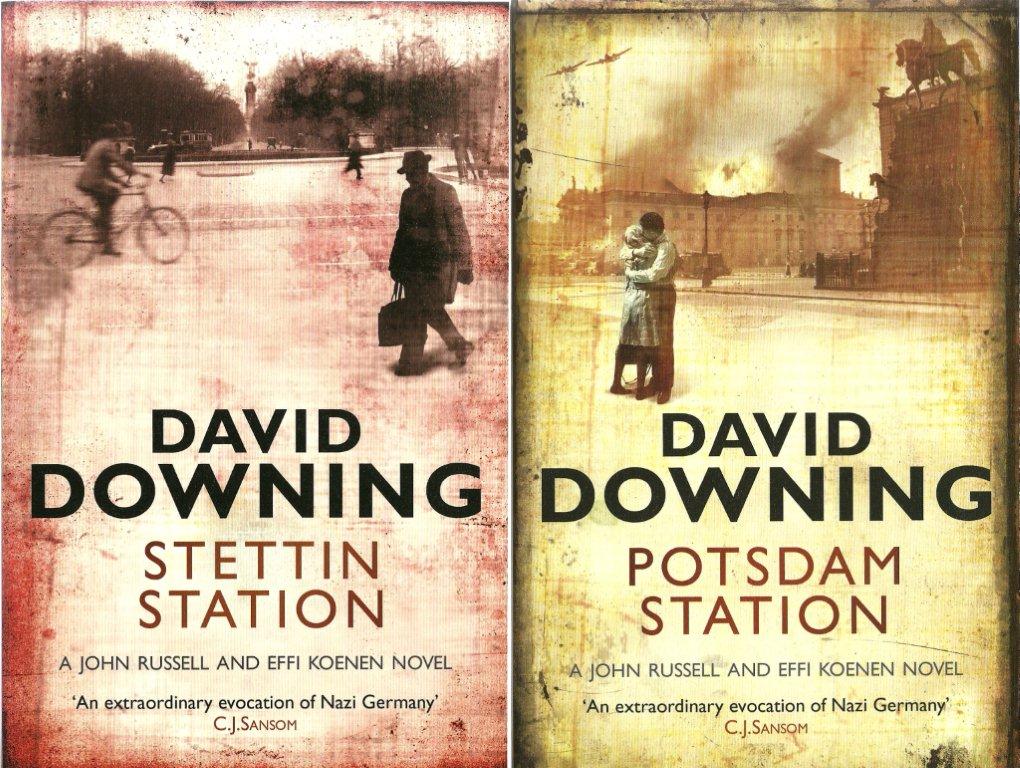
COSH BOY
Having mentioned that my good friend Professor Barry Forshaw has been commissioned to write an encyclopaedic history of British crime films, I have been inundated with a request that I urge him to include the notorious 1953 X-certificate offering Cosh Boy.
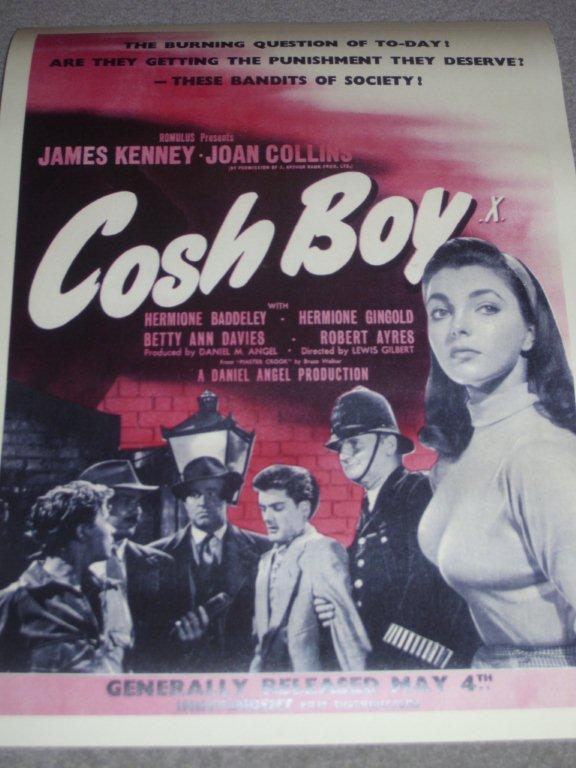
Whilst it might be the poster image of a young and pneumatic Joan Collins which catches the eye, the film’s X-certificate is probably explained by the fact that it starred those two queens of British cinema when at its most blood-soaked noir-ish best: Hermione Baddley and Hermione Gingold. Oddly, the spine-tingling pairing of the two Hermiones never reached the iconic status of Karloff and Lugosi or Lee and Cushing. Perhaps Professor Forshaw’s forthcoming book will tell us why.
Pip! Pip!
The Ripster
And for those of you who prefer the pdf version, here it is
GAWM51.pdf
|